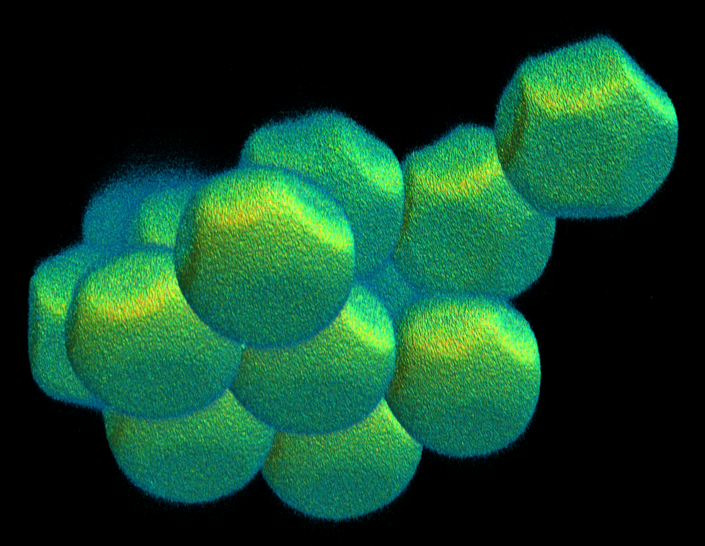Materials and Devices for Life Sciences

Project Summary
For this Program of research, students are encouraged to propose their own projects as part of their application, which can then be developed in collaboration with their supervisor(s).
The Materials and Devices for Life Sciences Program at EIT is focused on developing nanopore sensing and sequencing to transform clinical and personal diagnostics with powerful new devices that could be used at home or in point-of-care settings, and the scalable development of personalised therapeutics through the exploration of both synthetic tissue-like materials and living tissues prepared by three-dimensional printing.
The Program Lead at EIT is Professor Hagan Bayley, founder of Oxford Nanopore Technologies and the Professor of Chemical Biology at the University of Oxford.
Key areas of research include:
- Nanopore sensing of small molecules, proteins and glycans
- Leveraging protein pore technology for diagnostic techniques
- Advancing techniques for the fabrication of synthetic and biological tissues
- Producing hybrid tissues by combining synthetic and living cells
- Developing instruments, including enhanced nanopore devices and bespoke 3D printers for tissue engineering
Potential Supervisors
- Professor Hagan Bayley (Program Lead, EIT & Professor of Chemical Biology, Department of Chemistry, University of Oxford)
- Dr Linna Zhou (Researcher, EIT)
Skills Recommended
- Protein chemistry
- Synthetic organic chemistry
- Molecular genetics
- Cell and tissue culture
Skills to be Developed
- Stem cell and bioengineering techniques
- Optical microscopy
- Device engineering and applications
- Knowledge of regulatory pipelines
University DPhil Courses
Relevant Background Reading
- Recent Bayley Group Publications
- Riexinger, R., Caganek, T., Wang, X., Yin, Y., Chung, K., Zhou, L., Bayley, H. and Krishna Kumar, R. High-resolution patterned delivery of chemical signals from 3D-printed picoliter droplet networks. Advanced Materials, e2412292 (2025). doi: 10.1002/adma.202412292
- Yang, X., Artibani, M., Jin, Y., Aggarwal, A., Zhang, Y., Muñoz-Galvan, S., Mikhailova, E., Rai, L., Mukherjee, N., Krishna Kumar, R., Albukhari, A., Ma, S., Zhou, L., Ahmed, A.A. and Bayley, H. 3D Microtumours Representing Ovarian Cancer Minimal Residual Disease Respond to the Fatty Acid Oxidation Inhibitor Perhexiline. Adv. Healthc. Mater. e2404072 (2025), http://doi.org/10.1002/adhm.202404072
- Zhou, L., Wolfes, A.C., Li, Y., Chen, D.C.W., Ko, H., Szele, F.G. and Bayley, H. Lipid bilayer supported 3D printing of human cerebral cortex cells reveals developmental interactions. Advanced Materials 32, e2002183 (2020). DOI: 10.1002/adma.202002183
- Zhang, Y., Riexinger J., Yang, X., Mikhailova, E., Jin, Y., Zhou, L. and Bayley H. A microscale soft ionic power source modulates neuronal network activity. Nature 620, 1001–1006 (2023), https://doi.org/10.1038/s41586-023-06295-y
- Jin, Y., Mikhailova, E., Lei, M., Cowley, S.A., Sun, T., Yang, X., Zhang, Y., Liu, K., Catarino, D., Soares, L.C. and Bandiera, S., 2022. Functional Integration of 3D-Printed Cerebral Cortical Tissue into a Brain Lesion. Nature Communications 14, 5968 (2023). https://doi.org/10.1038/s41467-023-41356-w; also in bioRxiv: https://doi.org/10.1101/2022.10.28.513987.
- Johnson, P.A., Menegatti, S, Chambers, A.C., Alibhai, D., Collard, T.J., Williams, A.C., Bayley, H. and Perriman, A.W. A rapid high throughput bioprinted colorectal cancer spheroid platform for in vitro drug- and radiation response. Biofabrication 15, 014103 (2023), https://doi.org/10.1088/1758-5090/ac999f




